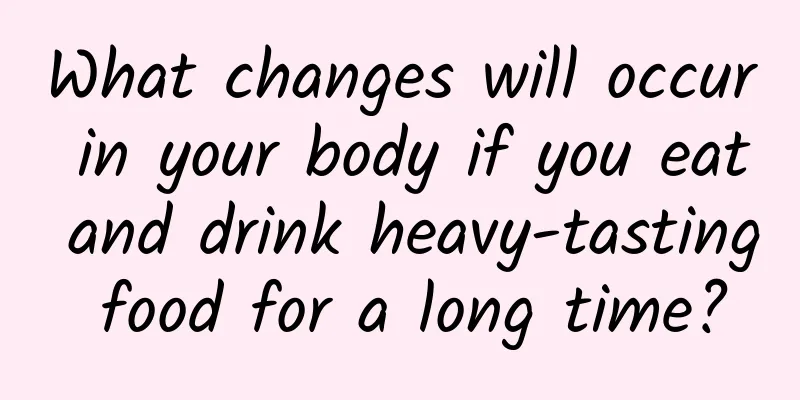What changes will occur in your body if you eat and drink heavy-tasting food for a long time?

|
The pace of life is fast nowadays, and many people have little time to cook. They can only eat takeout or fast food, as well as various beverages, fast foods, and pastries. These things have one thing in common - they contain surprisingly high amounts of salt. If you unknowingly consume too much salt every day and take in excessive amounts of salt for a long time, what will happen to your body? Let's discuss this in detail today. Image source: Galaxy What does the salt you eat do to your body? The main component of salt is sodium chloride. Eating too much salt in a short period of time will increase the sodium concentration outside the cells, that is, the osmotic pressure will increase. In order to restore the osmotic pressure, the brain will send a thirst signal to let you drink water. Many people think, isn't it just drinking more water? What's the big deal? In fact, the impact is not only drinking more water, increasing the number of toilet visits, but also affecting sleep at night, and more salt will retain more water in the body, and the next day this water will enter the loose parts and cause edema, such as face and lower limb edema, etc. In addition, the water retained in the body will immediately increase blood pressure . Studies have found that when an individual's 24-hour urinary sodium excretion increases by 100mmol, the systolic/diastolic blood pressure increases by an average of 3/0 to 6/3 mmHg. In addition, a high-salt diet (such as 11g of salt per day for 7 consecutive days) can also damage endothelial and microvascular functions, which are the basis for the occurrence of cardiovascular events such as acute myocardial infarction and hypertension. These body damages continue to occur with every heavy meal. If things go on like this for a long time, high blood pressure, coronary heart disease, kidney disease, etc. will come knocking on your door. Image source: Galaxy What changes will occur in the body if you eat a high-salt diet for a long time? A long-term high-salt diet may be more harmful to your body than you think. First of all, long-term consumption of too much salt will definitely affect blood pressure . After a comprehensive evaluation of 11 studies, the median or average follow-up period of these studies ranged from 3 to 11 years. The results showed that compared with people who consumed 2g of sodium per day (which is equivalent to about 5.09g of salt), people who consumed 4g and 6g of sodium per day had a 4% and 21% higher risk of hypertension, respectively. From reference [4] Secondly, a high-salt diet increases the excretion of calcium ions and increases the risk of osteoporosis. Image source: Reference [5] Furthermore, a high-salt diet also affects kidney function . Studies have found that compared with hypertensive patients who consume 2.93-4.03g of sodium per day (equivalent to 7.45g-10.25g of table salt), patients who consume more than 4.03g of sodium per day have a 38% increased risk of chronic kidney disease. In addition, a high-salt diet can lead to stroke and cardiovascular disease . Studies have found that for every gram of salt intake per day, the risk of stroke increases by 14%. How to change from "heavy taste" to "light taste"? People's sense of taste is developed gradually. We need to constantly strengthen health concepts, change cooking and eating habits, control the amount of salt in a measured way, and gradually develop a light taste. According to the Chinese Dietary Guidelines (2022), it is recommended that adults consume no more than 5g of salt per day. You can gradually reduce your salt intake based on your current daily salt intake. How to reduce salt intake? Here are 4 tips: 1. Pay attention to the problem of hidden sodium and eat less high-salt foods Seasonings such as chicken essence, MSG, and oyster sauce have high sodium content and should be paid special attention to; although some processed foods do not taste very salty, salt is added during the processing, such as noodles, bread, biscuits, etc.; certain pickled foods, salted foods, and pre-packaged foods such as processed meat products are often high-salt foods. The best way to control salt intake is to buy less high-salt foods. You can pay attention to the nutrition labels of pre-packaged foods, where sodium is a mandatory item. Image source: Galaxy 2. Choose fresh ingredients and use substitutions When cooking, try to retain the natural flavor of the ingredients as much as possible, so that you don’t need to add too much salt or other condiments to enhance the flavor of the food; you can also make good use of various natural seasonings when cooking, such as star anise, chili peppers, peppercorns, onions, etc. for seasoning. 3. Use cooking methods appropriately When cooking, you can add salt when the food is almost out of the pot or after turning off the heat. This can reduce the amount of salt used while maintaining the same saltiness. For stewed and boiled dishes, since there is more soup, you should pay more attention to the amount of salt used. Don't just taste it to determine whether there is too much salt, but use a measuring tool, such as a measuring spoon. In short, salt (sodium) is an essential nutrient. However, when our salt intake far exceeds the standard, it will greatly increase the burden on the body and bring health risks. We must change our "heavy taste" eating habits, embrace a healthy life, and welcome a better future. References [1]Yoshikawa M, Torimoto K, Hirayama A, et al. Daily salt intake is associated with leg edema and nocturnal urinary volume in elderly men. Neurourol Urodyn. 2020;39(5):1550-1556. [2]Elliott P, Stamler J, Nichols R, et al. Intersalt revisited: further analyzes of 24 hour sodium excretion and blood pressure within and across populations. Intersalt Cooperative Research Group [published correction appears in BMJ 1997 Aug 23;315(7106):458]. BMJ. 1996;312(7041):1249-1253. [3]Cavka A, Jukic I, Ali M, et al. Short-term high salt intake reduces brachial artery and microvascular function in the absence of changes in blood pressure. J Hypertens. 2016;34(4):676-684. [4]Filippini T, Malavolti M, Whelton PK, et al. Sodium Intake and Risk of Hypertension: A Systematic Review and Dose-Response Meta-analysis of Observational Cohort Studies. Curr Hypertens Rep. 2022;24(5):133-144. [5]Teucher B, Dainty JR, Spinks CA, et al. Sodium and bone health: impact of moderately high and low salt intakes on calcium metabolism in postmenopausal women. J Bone Miner Res. 2008;23(9):1477-1485. [6]Yoon CY, Noh J, Lee J, et al. High and low sodium intakes are associated with incident chronic kidney disease in patients with normal renal function and hypertension. Kidney Int. 2018;93(4):921-931. Planning and production Author: Jiang Yongyuan, Master of Internal Medicine, Third Military Medical University Reviewer: Tang Qin, Director and Researcher of the Science Popularization Department of the Chinese Medical Association Planning丨Lin Lin Editor: Lin Lin The cover image and the images in this article are from the copyright library Reprinting may lead to copyright disputes |
>>: China’s silver shortage is very serious!
Recommend
3 elements for beginners of APP operation and promotion strategy!
Operation and promotion require the most user res...
Traditional marketing model is dead. How can brand marketing break through and be reborn in the new media era?
1. “The Way of WeChat Operation ” The way of WeCh...
How to easily operate content-based products? Just learn these 5 tricks
In the Internet product market, content-based prod...
If you don’t understand these 6 points, you can’t be creative in advertising
Creativity is definitely the most frequently ment...
Five key points of the new media operation matrix!
The concept of "private domain traffic"...
User operations in Internet finance: How to promote high orders and high conversions?
I. Four Behavioral Characteristics of Internet Fi...
A must-read list for operators in 2018! !
Unconsciously, 2017 has come to an end. What kind...
Learn sales management from Huawei
Learn sales management from Huawei Resource Intro...
The best electric cars are not up to standard when they leave the factory? Tesla employees say more than 90% of Model S/X have repair problems
When talking about the best electric car in the w...
These 273 PR and marketing campaign tools in 2017 helped me turn from a novice into a planning expert in seconds
As a PR person who deals with offline events all ...
From "delivering people" to "delivering goods", the gorgeous transformation of the Tianzhou spacecraft
In May 2023, the Tianzhou-6 cargo spacecraft was ...
How much does it cost to make a small program similar to a forum community? How much does the community group buying mini program cost?
Q: How much does it cost to make a small program ...
As Apple continues to update its gameplay, what opportunities and challenges will ASO face?
Currently, the number of apps in the App Store ha...
The private domain skills of urban beauties with over 200,000 followers!
Affected by the epidemic, many traditional retail...
The truth in the garden: Plants scream when they are hurt? Hydrangeas are sterile?
Do plants scream when they are injured? Are hydra...









